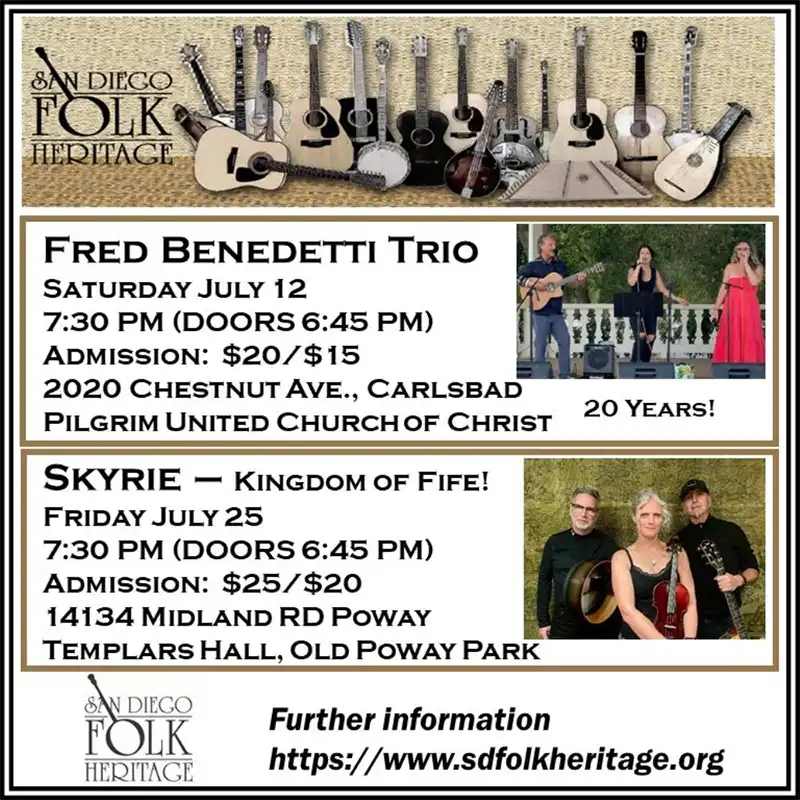Cover Story
JAVA JOE: Splendid Times Still Guaranteed for All
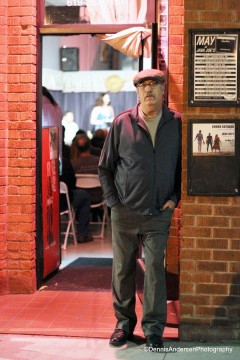
Java Joe Flammini
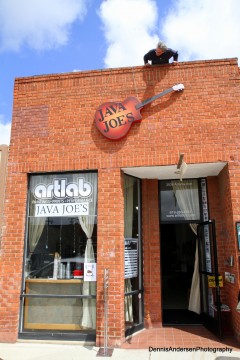
Owen Burke mounts the new Java Joe’s sign
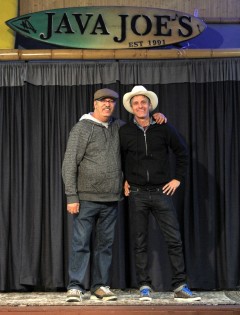
Java Joe and Steve Poltz at a previous location. Photo by Dennis Andersen.
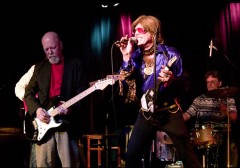
José Sinatra and the Troy Dante Inferno were frequent performers at Java Joe’s
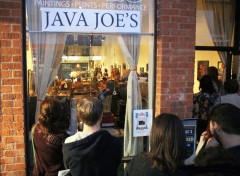
At Java Joe’s, looking in. Photo by Dennis Andersen.
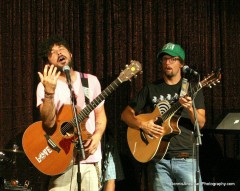
Bushwalla and Jason Mraz. Photo by Dennis Andersen.
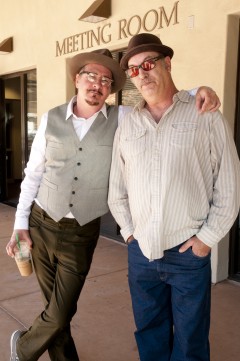
Gregory Page and Java Joe
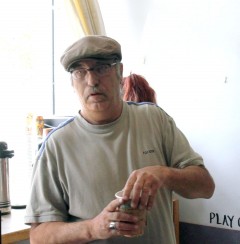
The friendly aromas once again kiss your nostrils, the comforting flavors glide into your mouth. Familiar faces are joined by new ones — all seem relaxed and happy — and there’s music in the air to make your soul dance. This enchanted place is both old and new, having existed in several different areas of San Diego during the last 23 years, recently landing in Normal Heights on arty Adams Avenue. The wizard is happy to get the roots growing again in this new location and thrilled by the new opportunities to create some more of his legendary magic.
Java Joe loves music and he loves people and he has an enviable track record of successfully, memorably bringing the two together. Beloved godfather to scores of San Diego songwriters and performers, his audience remains dedicated and growing because he seems to have somehow inoculated his venues against bad or indifferent shows.
The latest edition of Java Joe’s kicked off during the most recent Adams Avenue Unplugged festival on April 26th and 27th. SRO crowds spilled out onto the sidewalk and street for two days while the new stage was broken in by an incredible array of talent — a perfect christening that gifted its witnesses with some exceptionally sweet memories.
“Java Joe is a musical magnet. His is the greatest venue in the universe. I should know, I’ve been out there.” — Gregory Page
The greatness began in February 1991 when Joe Flammini, a former tuna fisherman, opened up his first coffeehouse in Poway and began fishing for musical talent to enrich the mood of the place. The amount of talent that converged there seems far too great to be considered as “beginner’s luck” when reflected back upon so many years later; words like “mystical” and “destiny” cannot be lightly tossed about. Lisa Sanders, Jeff Berkley, Robin Henkel, Steve Poltz, Gregory Page, Carlos Olmeda, Frank Drennen, Joy Eden Harrison, Elizabeth Hummel, Mary Dolan and so many others seem to have ignited there in the early years of the 20th century’s final decade. Today Joe is particularly wistful when recalling the prodigious output and dedication of John Katchur. “He really busted butt at my first place,” he exclaims fondly. “He was so great, delivering to his audiences exactly what they wanted, and right when they wanted it.” Then, of course, there was also that waitress who was steadily developing her own musical talents, whose Open Mic Night performances led to a notable career change in which the world would come to identify her pretty much by her first name only: Jewel.
One day in 1993, Joe closed up shop in Poway and moved down to Ocean Beach where he opened the new Java Joe’s at the corner of Newport and Bacon. That’s correct — all within one day. The entertainers from the Poway years followed and were joined by other artists such as Cindy Lee Berryhill, José Sinatra and the Troy Dante Inferno, Berkley Hart, Anya Marina, national touring acts like the Negro Problem, and some legendary marathons involving the Rugburns that would spill out into neighboring parking lots and define their own undefinable mix of insane virtuosity. It all made the race to the next century far more enjoyable.
“Java gave us a clubhouse; a constant open door, a safe place to be. Java Joe’s is my home. I stand behind Java Joe’s and Java Joe a hundred per cent. He’s a master at creating a space for real-life magic to happen.”— Jeff Berkley
In 2000 it was time for another change and Java Joe’s moved a block away to the northwest corner at Bacon and Santa Monica. Music was provided by all the Java Joe regulars as well as some notable new talents, including a young transplant from the east who quickly took over Thursday nights and planted the seeds for his own remarkable career. The kid was Jason Mraz, soon to grow into fame and fortune with his brilliant songs, some of which are close to becoming American standards. Actually, Mraz had started playing at the previous venue on Newport Avenue. As Java Joe tells it: “At the corner place, on Newport, Bill Silva, [Mraz’s] manager, walked him in, said, ‘This is Java Joe’s. Learn your craft; here is where you’ll play.’ Gregory Page was at Jason’s first open Mic performance, heard him, and talked to him after the show. Gregory said, ‘I’m playing here Saturday night. Would you like to open for me?’ So that was Jason’s first real show at Java Joe’s. When we moved up the street and he had those Thursday nights, that’s when it really took off.” The good feelings would often continue after closing time, with Jason moving the music and the audience out onto the beach to continue the concert around a glowing bonfire. Those were nights that no one who was there will ever forget.
The next incarnation of Java Joe’s happened way out at 63rd St. and El Cajon Boulevard. Christened Java Joe’s Pub, it proved a difficult place to get people to come out to, regardless of who was playing on any given night. A disheartening experience, it was “just the wrong location and it didn’t work out,” Joe recalls. After its short life, it was time for a period of hibernation. Down but not out, Java Joe rested, waiting for the right opportunity, the right location, a promising alignment of the right imaginary stars…
In 2012, he was given the chance to open a venue within the huge Ocean Beach Surf and Skate Shop on Newport Avenue, just east of where he had been located in the mid-to late-nineties. Joe drew a deep breath and grabbed the chance, only to have it eventually swiped from his grasp. “We had a walk-up window in the outside corner,” he recalls. “And then at night we would move all the clothes — the racks were on wheels — and we would have this huge room for a music venue.
“I was only there eight months. When the owner of the building decided he wanted it for other purposes in May of 2013, the surfboard/skate shop and Java Joe’s were given three weeks to get out… as well as three or four other little shops that had been in there.”
“Java Joe spends the better part of his life dedicated to providing musicians with a place to play. He does it not for the money but for the love of music. I love Java Joe. He’s my best friend.” — Lisa Sanders
Despite the untimely closing of his third Ocean Beach establishment, there had been enough good vibes generated amid the skates and boards and bikinis that the lucky fans who were there — and certainly Java Joe himself — can’t help but smile when recalling them.
“It was a great room for music,” Joe declares. “And the stage was real nice, even with the unconventional decor surrounding it. When the Tim Flannery Band came in to play, I don’t think Tim had anticipated all the surfboards that would be hanging over his head from the ceiling — but this was a surf shop, after all.
“Watching Tim’s reaction was priceless. We knew he was a man of many talents and interests, but some of us were unaware that he’s also an avid surfer… a devoted fanatic! He comes in, sees the place, and I swear, to me he looked like he’d just landed in Heaven. And his mood, with his music, was totally contagious.”
Equally legendary was the very last night at the Surf and Skate location. The Rugburns had been booked for the final show, scheduled to begin at 8pm. At about 6:30 Steve Poltz arrived to start a sound check. Joe explains what followed: “He was just practicing. Then Stinky (Jeff Aafedt) comes in, jumps in, and starts playing drums. So, they’re still practicing. Then John Castro walks in, starts playing bass; all three of them are practicing. Then Dr. Robert Driscoll walks in and starts playing guitar. Meanwhile the place has been slowly filling up while this is happening. So the result — they never stopped to officially start the show. The soundcheck from 6:30 just evolved into the show and went on till 11 or 11:30. That was the last show, and they totally rocked the place.”
Now, a year later, that gigantic Newport space remains unused and empty, a tragic waste of space. However, there’s a well-thought-out use of an entirely different space just a few doors east of the intersection of Adams Avenue and 35th Street in Normal Heights! Java Joe explains its genesis: “I was looking for a place again. Every now and then I’d call someone and say, ‘Hey, come and look at this place.’ One day I was with [Troubadour photographer] Dennis Andersen and I happened to ask him, ‘What’s going on at ArtLab? What’s the room like?’”
ArtLab was being run in conjunction with Ego id Media, located next door. It was serving as both a gallery and a music venue, and it wasn’t really working out that well as the latter. Joe met with the owner of both shops, Jim Yuran, giving him a brief history of what he’d done and where he’d been when Jim said, “Maybe we could do shows or something…” About a month later, the musical shows stopped at ArtLab. Jim got Joe’s number from Dennis and gave him a call.
The new Java Joe’s — the current Java Joe’s — resulted from Joe’s second meeting with Jim Yuran. The idea, Joe explains, was to “incorporate Jim’s art endeavors with the music and the coffee shop in one place.” Yuran curates his own gallery within the spacious lounge area at the back of Java Joe’s, and patrons can tour it at any time. The walls of the main seating area for performances have themselves become a gallery that will be devoted to a single artist each month — painting, photography, and other visual media will be represented and rotated 12 times a year. (A close friend of Joe’s, local singer/songwriter/artist Tara Nicole, will be the artist on exhibit in July.)
There will be music five nights a week, Wednesday through Sunday. Isaac Cheong is running the Open Mic Showcase on Sundays from 7pm to 10pm; sign-ups start at 6:30pm. There will be approximately 15 spots available each week, but it’s possible to adjust things to accommodate a few more. “We’re playing it by ear right now,” Joe admits, “but we’re really going to try not to turn anybody away — anyone who wants to play. But I always hope that people understand that it’s best to be prepared. I mean, borrowing a friend’s guitar and tuning it to your own specifications on stage for five or six minutes is likely to count as one of your two allotted songs. And I guarantee it won’t be a song the audience will be happily humming on their way home Sunday night.”
“Java Joe’s is more than just a coffee-crooner establishment. For those who know Joe, he provides a sanctuary for artists. We wouldn’t just play there. We hung out there. We ate there. We even slept at Java Joe’s. And because of the network of players and music fans that passed through regularly — passion and sweat, and years of melodious tears are forever stained on the walls and ceilings of Java Joe’s many incarnations.” — Jason Mraz
Thursdays will again be given over to a “residency” musician or act each month. Gregory Page was the artist for May (prior to another of his frequent overseas tours), and the always-outstanding Jeff Berkley is scheduled for June (he’s considering an option for July as well.)
During the daytime hours, Java Joe’s dons its Clark Kent persona and exists as a mild-mannered coffeehouse/art gallery. There are always blended beverages, pastries, and desserts from local shops like Heaven Sent and Sweet Cheeks; the actual java comes from award-winning Bird Rock Coffee.
The stage and lighting at the gorgeous new Java Joe VI (wow, that sorta sounds important) were a collaboration between Joe and Dennis Andersen. Andersen used his photographic skills to create the ambiance, which has a decidedly natural feel — no glaring bright spots or oversaturated colors. While his contributions might be easy to overlook, they are essential to the truly unique feel of the shows at Joe’s. And he’s very happy to be involved. “The fan base has been extremely loyal,” Dennis notes. “There are people coming here who were coming to the Poway store, as well as every other previous location. That astounds me. The public are filling the seats. I hear them talking to each other all the time when they’re walking in, saying, ‘Oh, remember? We met at the Poway store!’”
Joe himself quickly adds his own bittersweet observation: “Yeah, they walk in, come up to me, and say, ‘Gosh, it’s good to see you again! You used to date my mother!’ Now, that’s a loyal fan. We go through generations. I’m looking forward to the grandchildren. Glad to keep it an all ages venue… .”
Over the years, the musicians have come to love Java Joe and are happy to help him out if they become aware of any need that makes an unwelcome entrance into his sphere. Joe offers one example when coaxed, one imbued with a bit of righteous awe:
“I would never call Steve Poltz for a show; it just didn’t work that way with us. But there were many times when the money was short and I was wondering how I was going to pay the rent. Probably five or six times he called and said, ‘Let’s do three nights!’ And — this is before computers [now he’s computerized with javajoesd.com] — I’d sit at the telephone and we’d sell four or five hundred tickets in two or three days. It seems like he would always come through when times were tough. That meant a lot to me, still does now and always will.”
(I’ll personally attest to Steve Poltz’s generosity: one time he landed at the airport following a transatlantic flight and a successful tour. The first place he went? Directly over to Java Joe’s on Bacon Street for a friendly surprise visit just before closing time. At one point he opened up one of his suitcases, pulling out a sharkskin suit that instantly caught my eye and wouldn’t let go. Noting the seduction, Steve held it up and said to me, “You like it? It’s yours.” So he gave it to me just like that. Later on that night I’ll admit I employed the old Hungry Eye to his beautiful SUV as he was preparing to leave… he mustn’t have noticed, though, since he ended up driving it home.)
“Java Joe is a legend. He provides a home for wayward troubadours traversing the globe with songs to sing and stories to tell. He’s an easy hang, with an affable grin and contageous laugh. He’s sensitive and giving and crass and wonderful. His eyes are inquisitive — glassy and smiley. When I’m around him my blood pressure lowers and I slow down and ride on his magic carpet. My life is richer because of his friendship and I am proud to call him my pal.” Â Â — Steve Poltz
The latest resurrection of Java Joe’s makes it clear that within our city’s musical body, Adams Avenue must be seen as the jugular vein. Here is our own Music Row — the very heart of original music in our town, centrally located and with a variety of pulse points. Site of two of the largest free festivals on the West Coast, Adams Avenue’s infinite qualities result from the careful nurturing of its musical landscape by many hands over many years. It is substantial, vibrant, eclectic — qualities of which we all should be grateful and proud.
Java Joe is sitting in his office, setting up next month’s performance schedule during the free moments between answering one phone call after another. A gift from Jason Mraz glistens as it hangs on the north wall — it’s a framed gold record award for Mraz’s “Waiting for My Rocket to Come.’’ Joe has something else he wants to say, and suggests we step outside where he might have a better chance of properly expressing something that is very important to him.
Now, out on the Adams Avenue sidewalk, it comes from him easily. When Joe was down in Ocean Beach during those late-nineties’ heydays, the late, magnificent Marco Anguiano of the Adams Avenue Business Association would often reach out to him. “He used to contact me and was always urging me to come up into this very neighborhood. He’d say, ‘Come up here; I’ve got a great spot for you.’ Normal Heights was becoming more and more of an important area for the arts. But at that time, I had a place and couldn’t see doing two places at once. But his enthusiasm was something I’ve always remembered. So now after all these years, I’ve finally ended up here, where he’d wanted me.
“And it feels great,” Java Joe declares with a satisfied grin.
Marco must be smiling, too.


